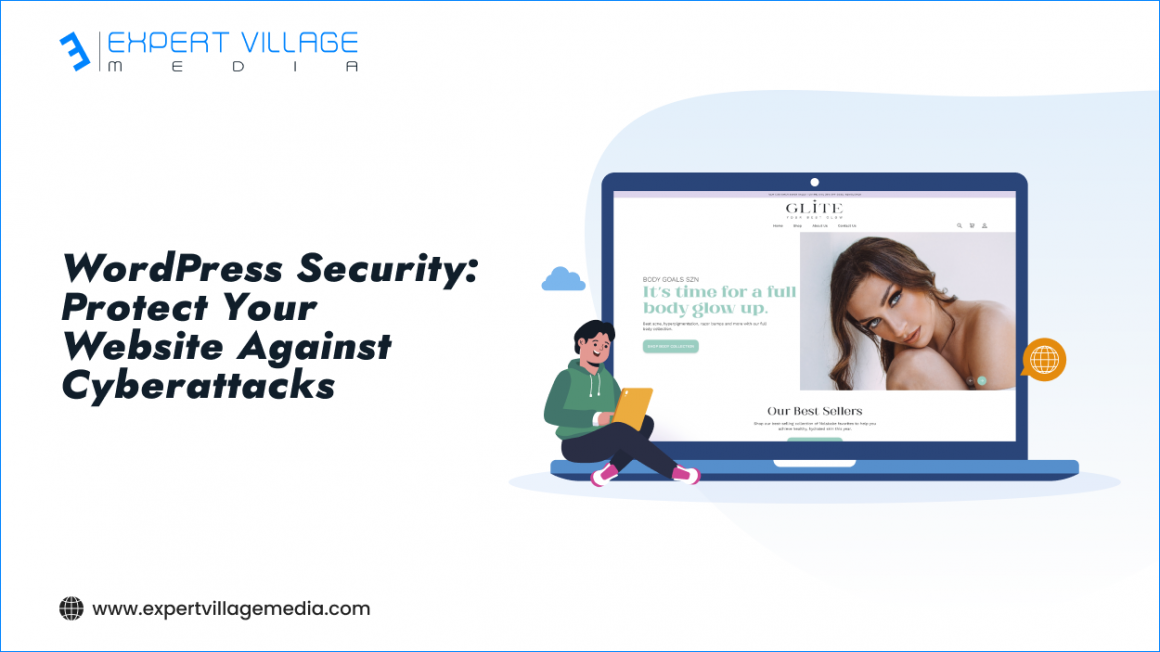Contents
In today’s digital landscape, protecting your WordPress site from cyberattacks is more important than ever. Cyber threats can compromise sensitive data, disrupt site functionality, and damage your reputation.
Partnering with a skilled WordPress website designer can help you implement essential security measures to safeguard your site. From using the best WordPress security plugins to conducting a comprehensive security audit for WordPress website, these steps are critical in preventing vulnerabilities and ensuring your website remains secure.
Taking proactive measures now will help defend against potential threats and maintain the integrity of your online presence. Hence read the following article till the end to know more.
WordPress security is important.
Your website communicates to potential customers who you are, what type of services and information you provide, and what to anticipate from your business.
Ensuring your website is always operational is crucial for maintaining your reputation. If your site is hacked, leading to malicious links, slow performance, or complete downtime, it can severely damage your brand.
You may face financial losses due to decreased views, sales, or ad impressions, and the cost of restoring your site can be significant. Additionally, your search engine rankings could drop, potentially causing long-term damage.
To avoid these issues, work with a WordPress website designer to implement the best WordPress security plugins and regularly conduct a security audit for WordPress website. This proactive approach will help keep your website secure, saving both money and reputation in the long run.
Primary Reasons For WordPress Becomes Insecure
Google has published a list of the most popular methods that hackers use to access websites. Let’s take a closer look at a couple of those:
- Compromised passwords
One of the most popular methods hackers break into a website is by brute force assaults. Thousands of password and username combinations are tried each second by bots until the correct one is found.
- Insecure themes and plugins
Bad actors can get access to websites very easily through vulnerabilities in plugins and themes. Patches for those vulnerabilities are often released by developers of premium themes in updates, although not all WordPress users update their websites.
Additionally, backdoors—access points for hackers to remotely enter your account—are frequently included in the code of nulled, free versions of premium plugins and themes.
- Inadequate security guidelines
It is simpler for users to gain access to your website when you follow poor security procedures, such as granting unauthorized users access to the site or using weak or insecure passwords.
WordPress security guide: 6 actions to prevent hackers from accessing your website
Select a safe hosting provider
Your hosting provider is your security ally, thus it’s critical to pick a reputable one. As they say, you get what you pay for, and a lot of cheap hosts don’t follow good security procedures.
However, how can you decide which one to pick? The following are some telltale signs of a safe hosting company:
- Frequent backups, either free of charge with your plan or at an extra cost.
- Free SSL certificates safeguard the information of visitors to your website.
- 24/7 assistance in the event that your website is compromised.
- An integrated firewall that safeguards your server’s database and files.
- Security checks that will notify you of any questionable behavior or code on your website.
- The most accurate approach to assess a host’s caliber is frequently through reviews and recommendations.
Last but not least never forget that a business with solid security and solid knowledge is well worth the extra expense. To assist you in getting started, below is a list of suggested WordPress hosting.
Update the core, themes, and plugins of WordPress.
The best approach to maintain the security of your website is to update WordPress, themes, and plugins on a regular basis. WordPress security vulnerabilities are often patched by new releases, thus updating as soon as possible is recommended.
Additionally, you may reduce the risks associated with WordPress security by selecting reliable plugins that satisfy several needs at once and are dependable.
To assist protect your WordPress website, Jetpack Security, for instance, provides a whole range of security features for WordPress. Thus, you may gain extra functionality without piling on several plugins and raising the possibility of a website assault.
Make safe passwords and usernames for WordPress.
Use a safe password and a distinctive username to keep hackers guessing. Include a number, symbol, lowercase, capital, and lowercase letter in your use of at least 20 characters.
Make sure you establish the appropriate permissions for each user when you’re developing a website with more than one. For example, you might not want your new intern to have access to core files or other crucial information. This is an excellent post about WooCommerce user permissions, but a lot of it can be applied to any type of website.
Additionally, if you set up an account for a third party, such as a support staff member, marketing firm, or developer, be careful to take down access as soon as their job is done.
Establish off-site backups.
Backups are essential for safeguarding your hard work, content, and visitor or customer data. Regardless of the problem affecting your website, having a complete backup available enables you to promptly resume operations.
But selecting the appropriate backups is crucial. Make sure, for instance, that your backups are kept off-site on the cloud as opposed to on your server. This implies that you can still restore a clean version of your website even if you lose access to it or your server is hacked.
In this situation, Jetpack Backup excels. Their backups are kept on the same secure servers as their website, but they also maintain several encrypted backups for an additional degree of protection.
Boost defense against brute force attacks
Brute force attacks happen when hackers use automated programs to guess thousands of password and username combinations every second in an attempt to access your website. These assaults can slow down operations by overloading your server, in addition to putting the information on your site in danger.
Secure login credentials are undoubtedly helpful, but the greatest defense is a device that will stop them cold. Before they ever reach your website, suspicious IP addresses are blocked by Jetpack’s free brute force attack prevention tool!
Check for viruses and security problems
You want to know as soon as possible whether a hacker succeeds in getting in so you can debug. Ultimately, the longer your website remains unavailable or unsafe, the more harm it may cause to your data and reputation.
However, Jetpack Scan scans your website automatically for malicious software, shady characters, and unusual activities. If it finds any, it notifies you right away. Most known hacks may even be fixed with a single click, saving you time and money.
Additionally, you won’t have to waste time understanding complex technical jargon because the Jetpack Scan dashboard leads you through each stage of the process and explains everything in simple words. You can relax knowing that your website is being watched over around-the-clock, just set it and forget it.
Conclusion
In conclusion, safeguarding your website from cyberattacks is crucial for maintaining the integrity and success of your online presence.
By working with an experienced WordPress website designer, you can implement robust security measures, such as installing the best WordPress security plugins and conducting regular security audit for WordPress website.
These proactive steps help protect your site from potential threats, ensuring data safety and customer trust. Investing in strong security not only defends against attacks but also preserves the reputation and functionality of your WordPress site.








